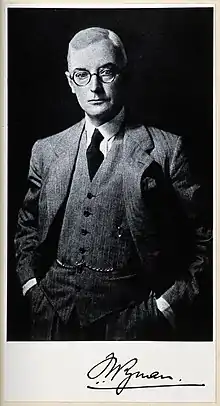Jeffries Wyman (June 21, 1901 – November 4, 1995) was an American molecular biologist and biophysicist notable for his research of proteins, amino acids, and on the physical chemistry of hemoglobin,[1][2][3][4][5] including the classic Monod–Wyman–Changeux model.
Dr. Jeffries Wyman | |
|---|---|
 Credit:Wellcome Images | |
| Born | June 21, 1901 |
| Died | November 4, 1995 (aged 94) |
| Children |
|
| Scientific career | |
| Fields | Molecular Biology |
| Institutions | |
Wyman was a member of the National Academy of Sciences and of the American Academy of Arts and Sciences,[4] the first scientific advisor to the US Embassy in Paris,[3] director of a regional science office in the Middle East for UNESCO,[3] a founder and past secretary general of the European Molecular Biology Organization,[1] professor of biology at Harvard.[2] Harvard University established Jeffries Wyman Fellowship in his name.[3]
Chronology
- 1901: born in West Newton, Massachusetts
- 1923: Harvard University, graduated with highest honors in philosophy and high honors in biology.[4]
- 1926: Ph.D., University College London.[4]
- 1928–1951: a professor of biology at Harvard University.[2]
- 1955–1958: director of a regional science office in the Middle East for Unesco.[3]
- 1958–1984: scientist at the Regina Elena and the Biochemistry Institute of the Sapienza University of Rome.
- 1984: retirement.
- 1995: dies in Paris, France.
See also
Notes
- 1 2 3 Obituary, The New York Times (9 November 1995).
- 1 2 3 Harvard University:Wyman, Jeffries, 1901-1995. Papers of Jeffries Wyman, 1957-1985 : an inventory Harvard University Archives
- 1 2 3 4 5 "Harvard University:First Jeffries Wyman Fellow Selected". Archived from the original on 2008-08-21. Retrieved 2012-01-14.
- 1 2 3 4 (Alberti & Di Cera 2003).
- ↑ (Simoni, Hill & Vaughan 2002).
- ↑ "Anny Wyman, at 84; trailblazing journalist". 2014-07-28. Archived from the original on 2020-12-12.
- ↑ "About Jeffries Wyman". Archived from the original on 2015-02-14.
References
- Alberti, Robert A.; Di Cera, Enrico (2003), "Jeffries Wyman", Biographical Memoirs, Biographical Memoirs of the National Academy of Sciences, vol. 83, Washington, DC: National Academies Press, pp. 362–377, ISBN 0-309-08699-X, ISSN 0077-2933 (ISBN 0-309-52769-4 for the PDF edition).
- NY Times (November 9, 1995), "Jeffries Wyman, Molecular Biologist, 94", The New York Times, retrieved 3 November 2012.
- Simoni, R. D.; Hill, R. L.; Vaughan, M. (2002), "Protein chemistry and the development of allosterism: Jeffries Wyman", The Journal of Biological Chemistry, 277 (46): E34, doi:10.1016/S0021-9258(19)71819-5, PMID 12426446.
This article is issued from Wikipedia. The text is licensed under Creative Commons - Attribution - Sharealike. Additional terms may apply for the media files.